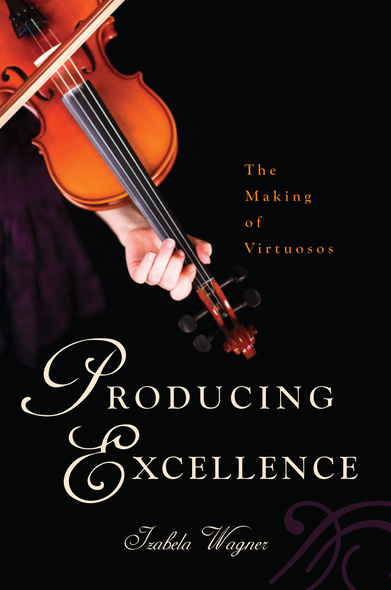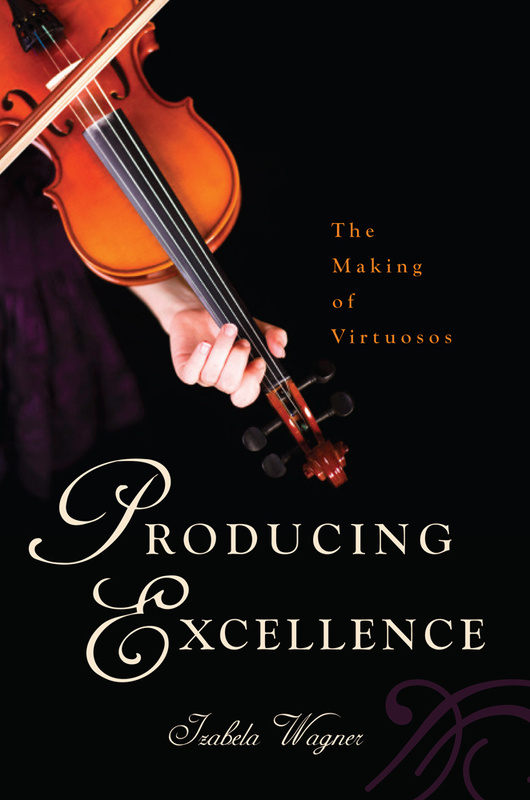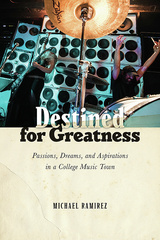Our shopping cart is currently down. To place an order, please contact our distributor, UTP Distribution, directly at utpbooks@utpress.utoronto.ca.

336 pages, 6 1/8 x 9 1/4
1 table
Paperback
Release Date:25 Sep 2015
ISBN:9780813570051
Hardcover
Release Date:25 Sep 2015
ISBN:9780813570068
Driven by a passion for music, for excellence, and for fame, violin soloists are immersed from early childhood in high-pressure competitions, regular public appearances, and arduous daily practice. An in-depth study of nearly one hundred such children, Producing Excellence illuminates the process these young violinists undergo to become elite international soloists.
A musician and a parent of a young violinist, sociologist Izabela Wagner offers an inside look at how her young subjects set out on the long road to becoming a soloist. The remarkable research she conducted—at rehearsals, lessons, and in other educational settings—enabled her to gain deep insight into what distinguishes these talented prodigies and their training. She notes, for instance, the importance of a family culture steeped in the values of the musical world. Indeed, more than half of these students come from a family of professional musicians and were raised in an atmosphere marked by the importance of instrumental practice, the vitality of music as a vocation, and especially the veneration of famous artists. Wagner also highlights the highly structured, rigorous training system of identifying, nurturing, and rewarding talent, even as she underscores the social, economic, and cultural factors that make success in this system possible.
Offering an intimate portrait of the students, their parents, and their instructors, Producing Excellence sheds new light on the development of exceptional musical talent, as well as draw much larger conclusions as to “producing prodigy” in other competition-prone areas, such as sports, sciences, the professions, and other arts. Wagner’s insights make this book valuable for academics interested in the study of occupations, and her clear, lively writing is perfect for general readers curious about the ins and outs of training to be a violin soloist.
A musician and a parent of a young violinist, sociologist Izabela Wagner offers an inside look at how her young subjects set out on the long road to becoming a soloist. The remarkable research she conducted—at rehearsals, lessons, and in other educational settings—enabled her to gain deep insight into what distinguishes these talented prodigies and their training. She notes, for instance, the importance of a family culture steeped in the values of the musical world. Indeed, more than half of these students come from a family of professional musicians and were raised in an atmosphere marked by the importance of instrumental practice, the vitality of music as a vocation, and especially the veneration of famous artists. Wagner also highlights the highly structured, rigorous training system of identifying, nurturing, and rewarding talent, even as she underscores the social, economic, and cultural factors that make success in this system possible.
Offering an intimate portrait of the students, their parents, and their instructors, Producing Excellence sheds new light on the development of exceptional musical talent, as well as draw much larger conclusions as to “producing prodigy” in other competition-prone areas, such as sports, sciences, the professions, and other arts. Wagner’s insights make this book valuable for academics interested in the study of occupations, and her clear, lively writing is perfect for general readers curious about the ins and outs of training to be a violin soloist.
To all those kids out there dreaming of reaching the highest levels of classical music fame, this book whispers be careful what you wish for.' 5-star review
Employing ethnographic evidence that is breathtaking in scope, professor Wagner combines illuminating analysis with compelling and often poignant narrative. Soundly organized and lucidly written, Producing Excellence presents an intimate and insightful view of a fascinating art world.
Wagner's Producing Excellence is a first-rate piece of ethnographic observation, a solid work of sociological analysis, and a fascinating story of the complex and at times cruel world that produces the violin virtuosi we read about in the newspapers.
The narrative of the child prodigy bewitches parents, and not just when it comes to music. We’re taught that the cost of genius is instability or underdevelopment in other areas, but we rarely hear about the people who finish third through tenth. Also-rans make up the vast majority in every race, but in any field of elite competition the losers have to subject themselves to the same work, same costs, same instability, same underdevelopment, but without the glory or affirmation that come with making it. We like to believe that the winners were that much better or tried that much harder, but the difference between the two is often an arbitrary twist of fate or a powerful person’s whim.'
Read the full article here (http://bit.ly/1NroPNt)
As several sociologists writing about music worlds, Wagner is herself deeply embedded within the field studied … She reports with rare intellectual honest the methodological pros and cons deriving from this 'embedded researcher' condition … Hopefully her book will help in proving artistic careers as a significant research field not only for sociologists of arts and culture, but also of education and work.
A keen-eyed participant-observer study of the career training of violin virtuosi.
IZABELA WAGNER is an associate professor at the University of Warsaw’s Institute of Sociology. She is the author of Becoming a Transnational Professional.
Acknowledgments
Introduction: Prelude—Scandal on the Stage
1 A Short History of the Virtuoso Profession
2 Before Entering Soloist Class: Early Socialization of Soloist Students
3 Triad Collaboration: First Stage of Soloist Education
4 Crisis and Career Coupling: The Second Stage of Soloist Education
5 Entrance into Adult Career: The Third Stage of Soloist Education
6 The Soloist Class Students’ Careers
Conclusion: Career Coupling and Nothing New in the Soloist World
Appendix Difficulties and Limits: Some Methodological Aspects about Attachment and Distance within Ethnographic Work
Notes
References
Index
Introduction: Prelude—Scandal on the Stage
1 A Short History of the Virtuoso Profession
2 Before Entering Soloist Class: Early Socialization of Soloist Students
3 Triad Collaboration: First Stage of Soloist Education
4 Crisis and Career Coupling: The Second Stage of Soloist Education
5 Entrance into Adult Career: The Third Stage of Soloist Education
6 The Soloist Class Students’ Careers
Conclusion: Career Coupling and Nothing New in the Soloist World
Appendix Difficulties and Limits: Some Methodological Aspects about Attachment and Distance within Ethnographic Work
Notes
References
Index








